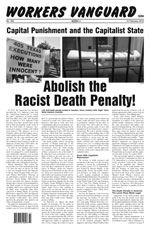
MLK Did Not Lead 1966 March in Cicero (Young Spartacus pages) (Letter) 16 January 2010 Dear Young Spartacus, It is no accident that there is a widespread myth that Martin Luther King led a civil rights march into Cicero in 1966 (cf., “Corrections,” WV No. 945, 23 October 2009). That myth has been deliberately propagated. One source is a biography of King posted on the Web site of the Martin Luther King, Jr., Research and Education Institute at Stanford University. The biographical article states: “King was stoned by angry whites in the Chicago suburb of Cicero when he led a march against racial discrimination in housing.” The institute’s director is Clayborne Carson, author of a number of works on King, as well as In Struggle: SNCC and the Black Awakening of the 1960s (1981). Another influential source of the myth is the award-winning 2004 documentary film Citizen King, which was produced, directed and written by Orlando Bagwell and W. Noland Walker. It is difficult to imagine that those filmmakers—and the King scholar Carson—were unaware of the fact that King did not support the 4 September 1966 civil rights march in Cicero. In fact, all three worked on the award-winning public television documentary series Eyes on the Prize, one of the many works that have accurately recounted that history. Carson served as senior advisor to Eyes on the Prize, and Bagwell produced a number of episodes in the series. Walker served as production assistant on the episode that deals with King’s Chicago campaign, Two Societies: 1965-1968 (1990). Two Societies accurately presents dramatic footage of several protest marches in late July and early August into Gage Park and other all-white enclaves in Chicago’s Southwest Side, in which civil rights protesters were confronted by mobs of white racists. Two Societies then recounts King’s signing of an accord with Chicago mayor Richard Daley, after which, as the film’s narrator states, King “agreed to stop the marches, including the march into Cicero.” The film presents an interview with Robert Lucas, who was the leader of Chicago CORE. Lucas recounts that King called him shortly before the Cicero march to ask that he call it off. This is followed by footage of courageous civil rights demonstrators braving a gauntlet of rioting racists in Cicero. In contrast, Citizen King goes to considerable lengths to create the false impression that King led the march in Cicero. This section of Citizen King is introduced by shots of street scenes in Cicero, starting with a close-up of a “Welcome to Cicero” street sign. The voice-over states: “Dr. King decided that he was going to march in Cicero.” The film then cuts to what are supposedly scenes of the Cicero march. In fact, what Citizen King shows are brief snippets from the actual Cicero march spliced into a lengthy pastiche of scenes from the protests in late July and early August, all apparently showing the Cicero march. We see King emerging from his car, supposedly to join the Cicero demonstration; actually, it was the 5 August protest in Marquette Park. We see cars being overturned and burned; this actually happened following the 31 July demonstration in Gage Park. In the middle of this deceptive montage, Citizen King cuts to an interview with a black former Chicago policeman, who declares, “One guy hit King with a brick in the Cicero march, and gashed him in the head.” This is followed by a film shot of King holding his head after being hit. However, that attack on King took place not in Cicero but at the 5 August protest in Marquette Park. Finally, driving home the false impression that all of these protest scenes took place in Cicero, the filmmakers follow them with an excerpt from an interview with King in which he explains the importance of fighting for integration in places like Cicero. In fact, much of the footage deceptively presented in Citizen King as showing the Cicero march was used in the earlier Eyes on the Prize episode, Two Societies, where it was correctly identified as showing the earlier protests. The obvious effect is to blot out the memory of the march that actually did take place in Cicero. King called off the planned march into Cicero after signing a bogus “open-housing” agreement with Daley, that the mayor, the bankers and the realtors had no intention of implementing. Militants of CORE and others maintained the Cicero protest, marching under a hail of rocks and bottles. The fact is that the real Cicero march underlined the ignominious collapse of King’s Chicago campaign against housing discrimination. Even the biographical article cited above acknowledges that King’s Chicago campaign “resulted in no significant gains.” It was in Chicago that the liberal premises of the civil rights movement came most clearly into explosive collision with economic and social reality. Blacks in Northern ghettos already had the formal rights won by the civil rights movement in the South—“equality under the law” and “one man, one vote”—but that did not prevent them from being forced to live as second-class citizens. As was made abundantly clear in Chicago, King and the rest of the liberal civil rights leadership had no program to fight the causes of racial discrimination, which are deeply rooted in the economic and social structure of capitalist society. The myth that King led the march in Cicero helps to obscure that fact. Comradely,
|
|
|||||||||||||||||||||||||||||||||||||||||||||||||||
